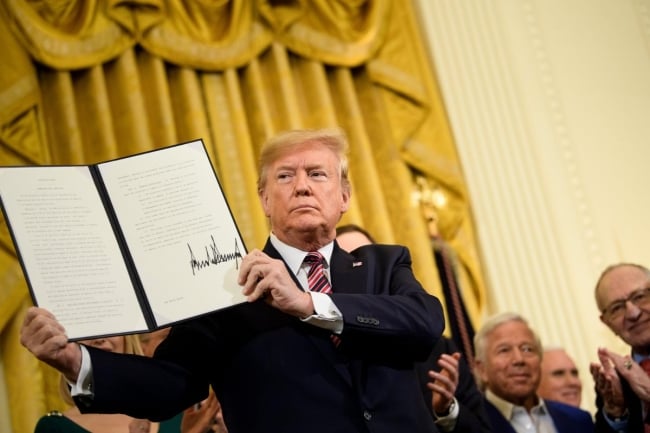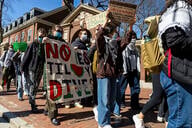You have /5 articles left.
Sign up for a free account or log in.

Pictured in 2019, then-president Trump holds an executive order that directed federal agencies to utilize the IHRA definition of antisemitism in Title VI enforcement.
Brendan Smialowski/AFP via Getty Images
Ever since pro-Palestinian student protests began last fall in the wake of Hamas’s Oct. 7, 2023, attack on Israel, universities have been in the political hot seat. Politicians—especially, but not exclusively, Republicans—have harshly criticized institutions for allowing such protests, which they often characterized as antisemitic, on their campuses. Many protesters and their supporters, meanwhile, argue that their actions are not antisemitic and that, in fact, anti-Arab and Islamophobic bias has ballooned over the past year.
Those concerns have launched dozens of complaints from both sides, alleging that U.S. universities failed to adequately respond to antisemitic or Islamophobic harassment, as they are required to do under Title VI of the Civil Rights Act of 1964, which prohibits discrimination based on race, color or national origin. It also covers discrimination based on shared ancestry, which includes antisemitism and Islamophobia.
Numerous complaints have already been resolved; in many cases universities agreed to take strong steps to ensure their campuses are no longer a “hostile environment” for Jewish or Muslim students, such as requiring new trainings for employees and/or students and improving processes for handling Title VI complaints.
But many still remain in the pipeline; the Department of Education’s Office for Civil Rights lists 78 open cases at institutions of higher education since Oct. 7, 2023. With Donald Trump’s second term fast approaching, what can colleges and universities expect from the federal government in terms of handling the complaints—as well as the ongoing conflict over pro-Palestinian campus speech?
What Trump Has Said
The president-elect appears poised to crack down on campus protests, based on what he told Jewish donors at an event in September: “Colleges will and must end the antisemitic propaganda or they will lose their accreditation and federal support,” he said, according to Reuters.
At a private donor gathering in May, he threatened to deport foreign student protesters, attendees told The Washington Post. “As soon as they hear that, they’re going to behave,” he reportedly said of the international students. At the same event, he also praised the New York Police Department’s crackdown on the pro-Palestinian encampment at Columbia University.
Trump’s Track Record on Antisemitism and Title VI
The scale and intensity of the pro-Palestinian student protest movement that emerged in October 2023 was unlike any that occurred during Trump’s presidency, so there is no track record of how his administration may have addressed such protests.
Still, he has long shown allegiance to Israel in international politics and supported the much-debated notion that anti-Zionism is inherently antisemitic. Most notably, he signed an executive order in 2019 requiring federal agencies to “consider” the International Holocaust Remembrance Alliance definition of antisemitism when investigating Title VI cases. According to the IHRA definition, certain criticisms of Israel, such as “claiming that the existence of a State of Israel is a racist endeavor,” are considered antisemitic. Shortly after the order was passed, Trump senior adviser Jared Kushner wrote in The New York Times, “Anti-Zionism is anti-Semitism. The inclusion of this language with contemporary examples gives critical guidance to agencies enforcing Title VI provisions.”
That view has been critiqued by free speech advocates, who argue that it stifles genuine political criticism of Israel. Kenneth Stern, the director of the Bard Center for the Study of Hate, who authored the definition, has expressed doubts that it should be enshrined into law, saying he would not want a college to face punishment simply for hosting a lecture that cast Israel in a negative light, for instance.
Kenneth Marcus, who led OCR during Trump’s first term, took a hard stance against allegations of antisemitism on U.S. campuses as soon as he took the post: He immediately reopened a seven-year-old case against Rutgers University, using the IHRA definition to do so. More recently, in his role as founder and chairman of the nonprofit Louis D. Brandeis Center for Human Rights Under Law, Marcus has been a top voice opposing the latest wave of pro-Palestinian protests, filing numerous OCR complaints since Oct. 7 and even suing the department for allegedly “failing to follow its own procedures” in dismissing a complaint that the University of Pennsylvania had fostered an environment of antisemitism on campus.
At the same time, Trump has been criticized for his own use of antisemitic rhetoric. Perhaps most notably, he once declared that there were “very fine people on both sides” of the Unite the Right rally in Charlottesville, Va., where white nationalists chanted, “Jews will not replace us.”
“That, to me, is the hard thing: to say you want to do something while at the same time endorsing classical antisemitic tropes,” said Kevin Rachlin, Washington director for the Nexus Leadership Project, a nonprofit that combats antisemitism. “Actions speak louder than words in this case.”
What Comes Next?
It’s unclear what exactly it would look like—or if it’s even possible—for President-elect Trump to pull federal funding and accreditation from institutions that fail to end “antisemitic propaganda” on their campuses, a threat that seems to go hand in hand with his promises to “fire” accrediting bodies.
Kristen Shahverdian, the program director of campus free speech at PEN America, said that the organization is “concerned” about threats to accreditation, especially ones intended to stifle speech.
“This idea of going after the governance of higher ed and also their accreditation, it’s kind of a threat that can produce quite a chilling effect when it comes to upholding free speech on campus [and the] free expression rights of everyone on campus,” she said. “I think we’re definitely going to be speaking out pretty strongly against any encroachment towards that in the coming months.”
Rachlin said that he fears the Trump administration could seek to restrict funding from institutions accused of antisemitism without any sort of due process.
“I think some [politicians] truly believe that this is the way to protect students on campus—that we need this definition, that it needs to be in place, that universities that allow this shouldn’t get federal funding,” he said. “[But] I think that the draconian measures make people feel good without doing [anything].”
Brett Sokolow, chair of TNG LLC, a risk management consultancy and law firm, said he believes OCR is handling complaints under the current administration much like it did during Trump’s first term: by being receptive to claims that pro-Palestinian protesters created hostile environments for Jewish students under Title VI. That’s unlikely to change significantly when Trump returns to office, he said.
“I think we can expect OCR’s protections against antisemitism to be as strong or stronger than they are today … I think the administration will be likely to use Title VI as a tool to protect against antisemitism. I don’t necessarily see them using it as a tool to protect the rights of Arabs, Muslims, Gazans,” he said.
Rachlin also predicts that congressional hearings on campus antisemitism—which were spearheaded by Elise Stefanik, the New York representative whom Trump has chosen to be ambassador to the United Nations—will continue and potentially become more frequent and intense under Trump.
As for Project 2025’s proposal that the Department of Education be dismantled and OCR moved to the Department of Justice, Rachlin fears that move would stretch the already-overburdened office nearly to the breaking point. But he also said such a proposal indicates that Trump wants even higher stakes for institutions that are found to have responded insufficiently to claims of discrimination.
“Moving OCR into Justice, to me, reads that when a university is accused of this, that it’s no longer a civil issue, [but] that it becomes a criminal issue. That there might be potential criminal consequences for that,” he said.




